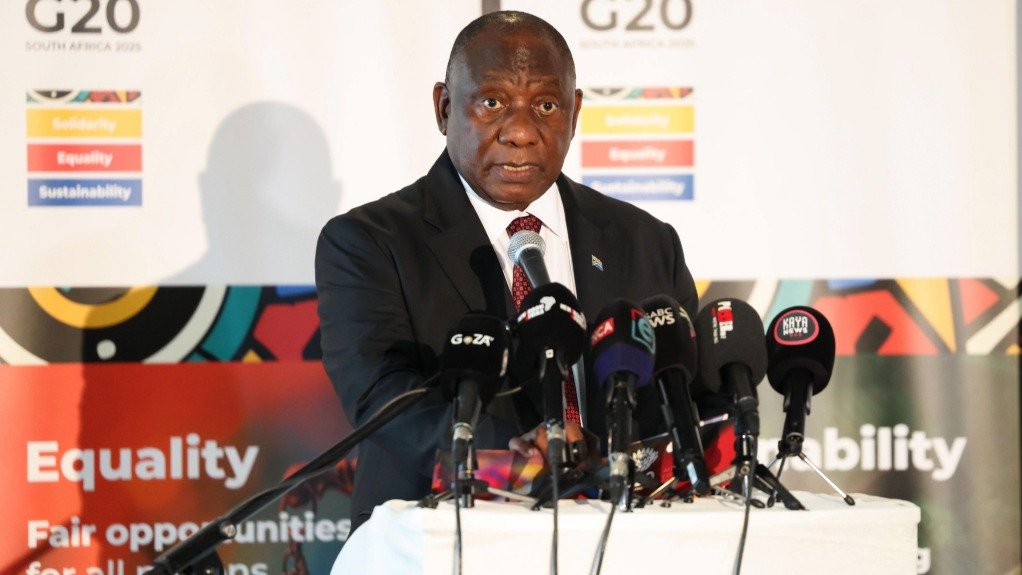The content on this page is not written by Polity.org.za, but is supplied by third parties. This content does not constitute news reporting by Polity.org.za.
With multiple crises spiralling out of control around the world, driving global inequality between and within countries, world leaders must prioritise principled global leadership to ensure the attainment of human rights, Amnesty International South Africa said ahead of the G20.
Over the past few years, the world has witnessed Israel’s live-streamed genocide committed against Palestinians in the Gaza Strip, and a civil war that continues to spiral out of control in Sudan. At home South Africa continues to be confronted by multiple crises including climate change and gender-based violence.
“From embracing increasingly authoritarian practices to waging wars that devastate the lives of countless civilians, an alarming number of world leaders are dragging humanity down an extremely dangerous path. It’s time for the G20 states to step up and do the right thing. This isn’t the moment to be reneging on international human rights obligations and other international commitments, putting people at further risk. Humanity must come first,” said Shenilla Mohamed, Amnesty International South Africa's Executive Director.
At the same time, President Cyril Ramaphosa and the government he leads must demonstrate this same level of commitment in addressing human rights challenges at home.
Disaster risk reduction
“South Africa is holding the 2025 G20 Presidency, and as the chair, it has set up the agenda and the overarching priorities for this year's discussions - including calling on the global community to strengthen disaster resilience and response. However, in South Africa, disaster response in informal settlements remains patchy and haphazard,” Shenilla Mohamed said.
“We have found in our report, Flooded and Forgotten, that the government is putting the well-being and in many cases the lives of the more than five million people living in South Africa’s informal settlements at risk by failing to provide them with access to quality housing and essential services. These people, many of them living on flood-prone land, are routinely left to cope on their own especially during severe weather conditions, despite the fact that the main responsibility for preparing for and responding to these disasters lies with the government.”
Human-induced climate change has exacerbated the risks of flooding, already a seasonal problem in South Africa’s informal settlements and underserved areas. As elsewhere in the world, this means that people who have contributed the least to climate change due to their low consumption patterns and are least able to cope with flooding are the worst affected by the impacts of climate change.
Amnesty International South Africa is calling on the government to mobilise all the necessary human, financial and technical resources to ensure that disaster risk reduction is fully integrated into urban planning processes and implemented with a view to protecting residents of informal settlements from disasters – climate induced or otherwise – and protecting their human rights.
Tackling the existential climate crisis
A key driver of many of the growing global crises is human-induced climate change, which is leading to greater economic inequality within and between countries. The devastating impacts of the climate crisis on human rights are soaring and will escalate dramatically if global heating is not kept in check.
Amnesty International’s research in countries such as South Africa, Madagascar, Tuvalu, Somalia, and Spain show the harms that climate change is causing. At the same time, fossil fuel extraction is harming the rights of people living nearby as we have documented in Brazil, Canada, Senegal and elsewhere. The science is clear – we urgently need to equitably phase-out fossil fuels to have a chance of keeping to the 1.5°C target in the long term and avoiding the worst human rights harms.
“At this year’s G20 as well as COP30, we need to see world leaders set clear timelines for a full, fast, fair and funded fossil fuel phase out and a just transition to sustainably produced renewable energy for all. Mandatory human rights and environmental due diligence across the value chains of transition minerals must be put in place to guarantee that the energy transition does not proceed at the expense of human rights,” Shenilla Mohamed said.
Amnesty is also calling for the massive scale-up of needs-based climate finance to lower-income countries, while G20 members must offer significant debt relief, including cancellation where appropriate, to all countries in or at risk of debt distress. Environmental human rights defenders must also be protected.
Gender-based violence
South Africa’s G20 priorities for women's advancement include addressing gender-based violence and femicide, another major issue facing South Africa.
President Cyril Ramaphosa has called GBV South Africa’s second pandemic yet the criminal justice system is still failing many victims and survivors.
“There needs to be consequences for those who perpetuate violence. This is where the broken criminal justice system has failed victims of GBV. It is because of this failing system, and more importantly the shoddy investigative work and lack of implementation of legislation, that there is little deterrent for perpetrators,” Shenilla Mohamed said.
“There needs to be accountability from state institutions that have failed survivors and those who have died because of violence.”
So dire is the situation of GBV in South Africa that women have consistently taken to the streets to demand that the state take their safety and security seriously, the latest being Women for Change’s shutdown happening on Friday. Amnesty International South Africa stands in solidarity with Women for Change and all who are participating in the G20 women’s shutdown.
Issued by Amnesty International South Africa
EMAIL THIS ARTICLE SAVE THIS ARTICLE ARTICLE ENQUIRY FEEDBACK
To subscribe email subscriptions@creamermedia.co.za or click here
To advertise email advertising@creamermedia.co.za or click here











